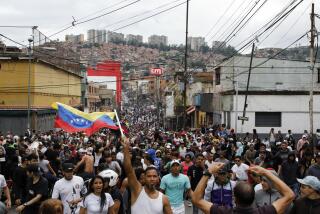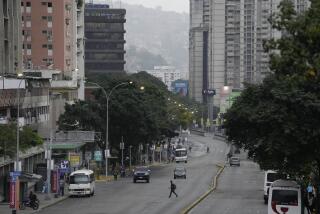Iranian Runoff Election Likely
- Share via
TEHRAN — In what appeared to be a shock to the hopes of Iranian reformers, state television said today that former President Hashemi Rafsanjani and the conservative mayor of Tehran were leading five other candidates in the race to take part in a runoff vote for president.
However, the results were thrown into confusion late this morning when incumbent President Mohammad Khatami went on national television and said there had been some mistakes in the announcement of the results. He said the actual figures would announced later in the day.
It was not immediately clear how the results might change, but it appeared that a runoff would still be needed Friday to determine the winner.
Reformers had pinned their hopes on Mostafa Moin, a balding former education minister who was seeking to be the first noncleric elected president of the Islamic Republic. A buoyant mood gripped Moin’s election headquarters late Friday as preliminary reports started trickling in, turning to anger as the results were announced.
Top officials of the campaign were huddled in a meeting, where they expressed fears that the initial results had been rigged.
State TV had announced earlier that with about 20 million votes counted, roughly 60% of those cast, Moin was in fifth place with 14% of the vote. Rafsanjani and Mahmoud Ahmadinejad, Tehran’s mayor, were leading, each with about 20%.
Moin also was said to be trailing a reformist cleric and a conservative former police chief. Other candidates followed with results in single digits.
“We are shocked by these reports,” said Elahe Koulaee, a spokeswoman for the Moin campaign. “They don’t correspond at all to the reports we received yesterday, or what our campaign representatives around the country witnessed.”
The head of the conservative Council of Guardians, Gholamhossein Elham, said the election would have to be resolved in a second round for the first time in the 26 years since the Islamic Revolution because no candidate would receive an absolute majority. The Council of Guardians oversees elections and determines who is eligible to run.
“It has been a completely unpredictable election and one still cannot foresee the final result,” Deputy Interior Minister Mahmoud Mirlohi told Reuters news agency.
Officials of both the Moin and Rafasanjani campaigns had said Friday that they expected a runoff between their candidates.
Both Rafsanjani, a merchant-mullah who was once a confidant of the late Ayatollah Ruhollah Khomeini, and Moin, a hero of the reform movement who backed students during clashes in 1999, have argued for greater engagement with the United States. Iran faces heightened pressure from Washington to democratize and to end its nuclear program.
Moin has said he would build on the legacy of Khatami, who advocated more personal liberties at home and a “dialogue of civilizations” abroad, but who was often stymied in his reform efforts by conservatives controlling the judiciary and the security services through Iran’s supreme leader, Ayatollah Ali Khamenei.
Conservatives had been hoping to regain the presidency after eight years of Khatami, who had constantly battled for greater freedoms inside Iran.
Voting was extended for four hours Friday as election officials sought to accommodate a late surge at the polls as the day’s heat broke.
Early results buoyed Moin’s supporters. Mohsen Safaei Farahani, former head of the Iranian soccer federation, read off returns he said he had obtained from a remote town in the central region where votes had already been counted. In one, he said, Moin had obtained 10,003 votes out of 15,030 cast; in another, 218 of 340; in a third, 104 of 140.
“This is unbelievable for us,” he said with a grin. “We did not advertise in this area because we could not afford it. It shows that our message has reached outside of Tehran.”
Moin at first had been denied a spot on the ballot by the Council of Guardians. The council reversed itself and allowed Moin and a second reformer on the ballot after the intervention of Khamenei, who has the final word in all state matters.
Some initial results of overseas voting also appeared to be encouraging for Moin. A press official in Tehran said the overseas tallies were running 27% for Rafsanjani, 26% for Moin and 24% for Ahmadinejad.
The other reformer on the ballot was cleric Mehdi Karroubi. Other main hard-line contenders were former head of broadcasting Ali Larijani and the former national police commander, Mohammed Baqer Qalibaf.
Across the country, he said, the campaign’s reports indicated that Rafsanjani, Moin, Ahmadinejad and Qalibaf were each polling strongly, but with Rafsanjani and Moin apparently “having the better positions.”
By 8 p.m., about 55% of the 47 million eligible voters had cast ballots. Interior Minister Abdul Vahed Musavi-Lari predicted a final turnout of about 60%, lower than in the last two elections but higher than conservatives had feared.
Critics of the Iranian regime had argued for an election boycott to demonstrate opposition to a system that gives ultimate power to the supreme religious leader, Khamenei, who is not popularly elected. Such a boycott could have been seen as a sign of disapproval of the state itself.
Officials attempted to use the sharp criticism Thursday from President Bush of the fairness of the Iranian election to prod voters to the polls, saying it would be the best riposte to the U.S. leader.
“The people’s participation in this election is ... proof that the U.S. president’s remarks regarding Iran’s presidential election are quite worthless,” Foreign Minister Kamal Kharrazi said after casting his vote in Tehran.
Rafsanjani, who was president from 1989 to 1997, has promised to use his business acumen to reconstruct the economy and bring greater prosperity. A pistachio merchant considered among the country’s wealthiest men, he has projected an avuncular, open-minded image in the campaign. “I have promised people to continue reforms and I am sure I can deliver,” he said Friday after voting.
The conservative camp had faced difficulties because of its inability to agree on a single candidate.
But among conservative voters interviewed in Tehran, many liked Ahmadinejad, the mayor, who has cultivated a can-do image.
“Khatami had ideas, but he was not able to put them into action. None of the candidates are actually rejecting what Khatami did.
“I think maybe Ahmadinejad will be able to succeed where he did not,” said Ali Haj Salmani, a 52-year-old businessman.
As on all Fridays, it was a day off work in Iran. Polls opened at 9 a.m., and at first the turnout appeared light at the voting stations situated in schools, mosques and other public buildings.
At sites with only one presidential voting box, men in shirt sleeves and women dressed in heavy black chadors or more liberal attire of colorful scarves pushed back to show their hair stood patiently side by side. Larger stations with two or more voting boxes put men and women in separate queues.
By midday, the lines had grown longer, stretching the length of a basketball court in a sports hall at Tehran University, and the voters marked paper ballots and dropped them into boxes covered by white cloth with green lettering.
Mohsen Janati, the headmaster of the Razi School in northern Tehran, was helping to oversee voting at his institution. For voters, he said, “the first issue is democracy. Then comes social justice.”
The demands of young people seemed key to the election. Half of Iran’s population is younger than 25, too young to remember the Islamic Revolution or the traumatic eight-year war with Iraq. The minimum age for voting is 15.
At Tehran University, many students indicated that they had weighed the possibility of staying away, but had changed their minds in the last weeks of the campaign after becoming convinced that Moin had a chance.
Rami Tabarsi, 21, a journalism student, said he decided to vote even though many of his fellow students thought it would be a waste of time.
“I voted for Moin because he can continue the work of President Khatami,” he said. “Khatami opened up good prospects for the young, especially in the area of culture.”
Ramin Taqavi, 27, said he realized that Iran’s system was not perfect, but he considered his vote a defense to keep it from getting worse.
“We want to penetrate the system, bring it closer to the ideal, and reform will bring it closer to our true beliefs,” he said. “Calls for revolution from the outside and interference by foreign countries does not help us. Any nation that cannot decide its fate for itself is stupid.”
But Ali Alizadeh, an English teacher in Tehran, dining in a seafood restaurant, said he and his wife, Vida, had no intention of legitimizing the government by voting.
“It is betraying the country to participate,” he said. “I believe all these candidates are gangsters, all belonging to the same gang.”
Conservatives argued that the ideals of Iran’s Islamic Revolution continued to work, and should even be exported.
“The election should be very important, first for Iran and the Iranians, and second, it could be very important to show the world the positive example of a democracy based on religion,” said Asghar Rakofikan, 32, a mullah voting with his wife and son in northern Tehran.
Special correspondent Nahid Siamdoust contributed to this report.
More to Read
Sign up for Essential California
The most important California stories and recommendations in your inbox every morning.
You may occasionally receive promotional content from the Los Angeles Times.










